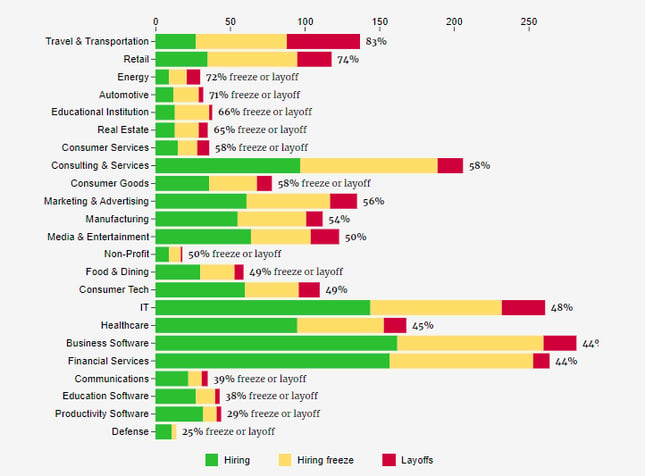The recent COVID-19 crisis has taken over almost every part of our lives. According to Worldometer, more than 1.4 million people have contracted COVID-19 worldwide as of April 8th.
The outbreak has hit the world economy hard, putting many professionals out of jobs and businesses. According to the UN Conference on Trade and Development, the pandemic might cost the global economy approximately $1-2 trillion in 2020.
Several business functions across industries have been massively impacted, including Talent Acquisition or Recruitment. This article highlights:
- Top 3 industries facing the biggest hiring challenges
- 6 key hiring challenges faced by employers during the Coronavirus crisis
- Solutions to help businesses continue hiring candidates safely and remotely
Industries Facing the Biggest Hiring Challenges
First, let’s take a look at how recruitment has been impacted across different industries. According to Candor, the industries hit the hardest by COVID-19 are hospitality, tourism and travel, and transportation.

According to these statistics, the coronavirus outbreak has derailed the hiring plans of most employers. Many enterprises across industries are pausing their hiring plans and others have no choice but to furlough or even let go employees. We can see its impact on the job market and the recruitment industry as we go further in the article.
On the other hand, a few industries, such as healthcare and ecommerce, are facing a sudden boom in the need to hire new employees. These industries, however, need to take appropriate measures to continue their recruitment process in a safe and effective manner (more on that later in the post).
6 key hiring challenges during the Coronavirus crisis:
1. Mass Layoffs
Companies are running short of business, finances, and resources. With a global pandemic at hand, many companies, especially small and medium sized companies, have no choice but to let go as many as they can without disrupting their business.
Many in the hospitality, tourism and travel, and transportation industries are facing the brunt of the pandemic and are forced to lay off employees (mostly daily wagers).
Other fields facing this issue are restaurants, bars, cinema and theaters, and logistics/manufacturing companies that deal directly with countries that are currently on a lockdown. US employers are cutting 701,000 jobs in March, 2020, according to SHRM.
Small and medium sized companies which can sustain for a few months on the resources they have, are not firing their current employees, but have frozen their hiring cycles until there is any more clarity on the situation.
2. Bulk Hiring
As mentioned earlier, there are also many industries that are experiencing a rise in labour demand, such as retail, ecommerce, supermarkets, sanitation workers, business software, remote meeting, and online learning.
Healthcare services, for instance, have seen a 35% hike in demand for employees, according to a report by LinkedIn.
Giants like Amazon and Walmart are hiring in bulk to keep up with the sudden rise in their demand worldwide.
Amazon’s CEO, Jeff Bezos said, “We’re hiring for 100,000 new roles and raising wages for our hourly workers who are fulfilling orders and delivering to customers during this period of stress and turmoil. We hope people who’ve been laid off will come work with us until they’re able to go back to the jobs they had.”
3. Onboarding Process
Another major recruitment problem that businesses around us can find themselves struggling with is onboarding of new joiners. These people are the ones stuck in between layoffs and new jobs. They have been offered a job and have to start working soon. Recruiters weren’t prepared for the current crisis and hence have limited resources for onboarding new employees remotely.
Despite their readiness, they have been forced to resort to video onboarding solutions. Having video calls and online material to prepare new joiners for work like onboarding a regular employee, keeping certain slots during the day to ensure they’re onboarded properly, addressing their doubts, and ensuring a regular and smooth onboarding are some of the additional tasks the HR teams have been burdened with.
4. Low Application Rate
Priorities are shifting — of people and businesses alike. Many are out of jobs, and many are scared to apply for new ones. People are scared of the current situation and of how it might unfold in the future.
Hence, they’re apprehensive of making any big decisions, like a job shift, before they know anything for certain. With a huge rise in unemployment in the past month, people are taking less chances of actively looking for new roles.
On the other hand, with more focus shifting towards HR functions and current employees these days, the focus on Talent Acquisition/Recruiting activities has definitely taken a back seat.
Companies are more inclined towards ensuring their current employees have all that it takes to function smoothly from home. Don’t get me wrong; that’s extremely important. But in the process, they’ve minimized efforts to attract new talent at a time when people have also slowed down their job hunt.
5. Cost-Cutting
This has been the first, instinctive step taken by companies, wherever possible. Hiring freeze isn’t enough. Unfortunately, manual recruitment ends up exhausting most of the budget allocated for recruitment, so cutting costs here doesn’t seem unlikely or odd. But this becomes a point of trouble for the recruiter.
According to People Matters, the overall hiring process is likely to witness a 60-65 percent drop; interviews will get delayed especially in service sectors due to fewer resources. Along with that, leadership hiring is seen to be frozen for the next six months.
Also, all B-school student internships are reported to be delayed or cancelled. These are some of the challenges in hiring employees faced by businesses right now.
6. Need for a Remote Hiring Process
As COVID-19 cases keep rising still, there is no clarity on when it’ll be over and when we would be able to resume our routine ways of work. Because of that, in recruitment, there's a heavy dependency on technology for hiring — remote video interviews, online campus drives, online classes and assessments for universities, etc.
Conducting assessments and interviews is going to be a big obstacle. What recruiters have been doing face to face all these years, they will have to do it online. HRs who were apprehensive about remote hiring are now forced to use remote hiring tools to conduct online interviews and onboarding. It not only takes time to get used to, but also might give way to anxiety.

The Silver Lining - How to Tackle these Difficulties in Recruitment
So what can we do to ensure we stay afloat, if not thrive, in a situation like this one?
Hire Passive Candidates:
Take this opportunity to hunt talent that is passive/free right now. Companies are seldom approaching any new recruits at this point.
So, reaching out to candidates and offering them new job opportunities is easier now than ever. And you can be assured of having their full attention, without the clutter of meetings, other job offers, and generally daily life.
There are also many people who were recently laid off. Take this opportunity to help them find a good job. This way you can be assured to find amazing talent without having to go out of your way or spend more resources than usual.
Go Remote
Remote hiring is on the verge of becoming the new norm. If you have not moved your hiring process online yet, now is the time to do so. Remote hiring is not only helpful now, but is a much needed upgrade in recruitment.
It is a necessary shift, and is being already adopted and mastered by global companies such as Amazon, Nestle, Cognizant, and more.. If you want to learn how to move your hiring process online, here is a collection of resources to help you understand and implement remote hiring best practices in your organization.
Further, there is also an increase in demand for Video Interviews and Online Assessments tools — both due to social distancing and also to improve the candidate experience in general.
Pre-recruitment assessments and online interviews promise a huge relief for recruiters for hiring new candidates during desperate times. Not only are they cost-effective but also cut time-to-hire by 50%.
Invest in Recruitment Automation Tools and Software:
At a time like this, it's best to start investing in an online and cost-effective recruitment software that will understand your requirements and help in online recruiting.
There is a good variety in the market to choose from. It's high time for companies to realize how recruitment automation can ease the recruiter’s burden in many ways, and that having a software does not add but considerably reduce the cost per hire.

Build CSR Initiatives:
This can be the time when your company focuses on CSR initiatives if they haven't already. There are many who are in need of supplies or any help they can get; be it businesses or citizens.
You can take this time out to partner with NGOs, government funds, or any local initiatives to help out people that require your support or resources.
This will not only help society revive from the effects of COVID-19, but also help in establishing the fact that your brand is conscientious and understands its social responsibility — also resulting in strengthening your employer brand.
Build a Solid Company Culture:
This can be a great opportunity to build a company culture. These times have proved that a company thrives with a solid culture in place. Set aside break time calls with your subordinates, stay in constant touch with teammates, help out the ones who might be struggling with such a change, be innovative and find creative ways to engage the whole company.
To help organizations embrace remote hiring practices due to COVID-19, Talview is also offering free or discounted services to help current customers, past customers, and non-customers hire with ease. For more details, please visit this page or reach out to us directly at safehiring@talview.com.








Leave a Reply